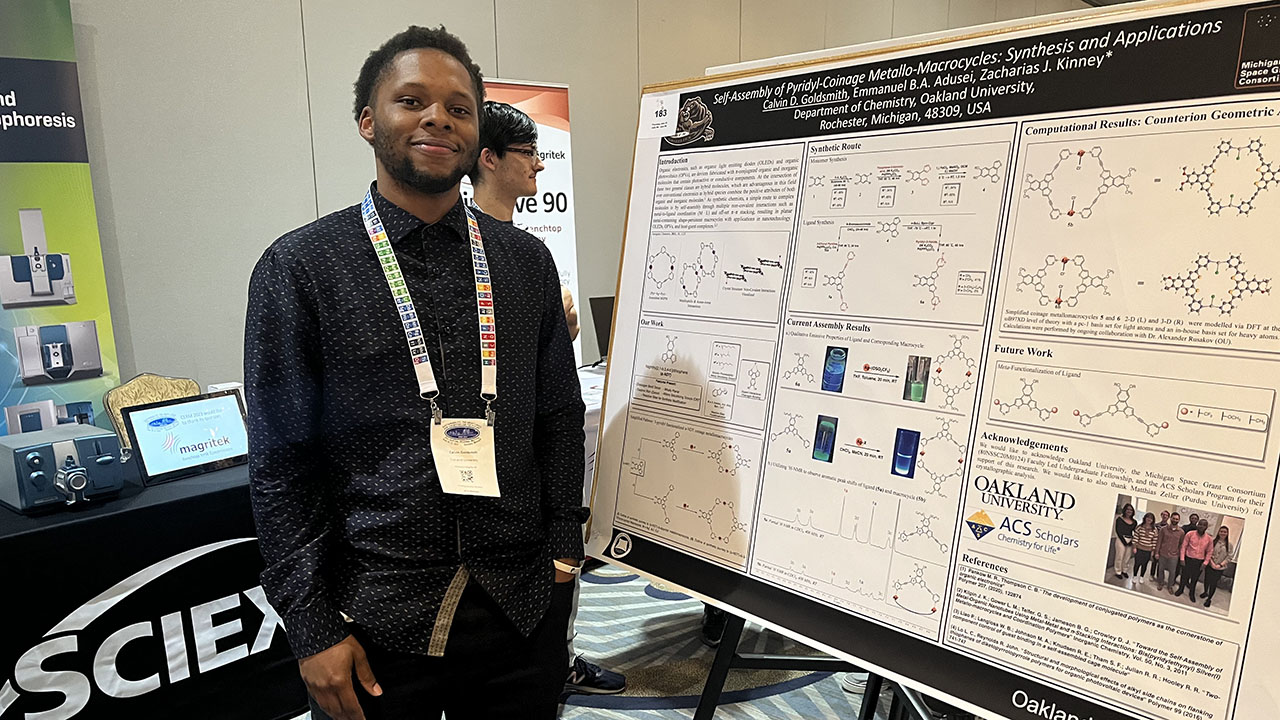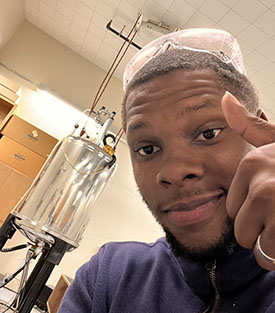Chemistry student earns CAS Meritorious Achievement Award, NSF award among long list of accolades

Calvin Goldsmith admits there were times he really struggled with chemistry when he arrived at Oakland University as a freshman.
Thanks to a relentless drive to succeed and some great opportunities, Goldsmith is set to graduate from Oakland with a degree in chemistry and a long list of accomplishments, including the Meritorious Achievement Award (the highest honor for a student in the College of Arts and Sciences). He will speak at commencement.
Goldsmith credits a lot of his success to Assistant Professor of Organic Chemistry Zacharias Kinney, whom he developed a strong relationship with during his time at Oakland.
“I liked him right away because he was very interpersonal and had great communication,” Goldsmith said. “The image a lot of people have in their mind of a chemist is probably some boring guy in a lab coat, but he wasn’t like that at all. I don’t think I could have found a better mentor than him because he was so patient with me. He wants to set up his students for success.”
Goldsmith enjoyed plenty of success, including being awarded the Michigan Space Grant Consortium Award, Provost Undergraduate Student Research Award, the Joel Russell Chemistry Scholarship (twice), the James Morrison Thompson Scholarship and the Center for Multicultural Initiatives Rendition Scholarship.
Goldsmith was a undergraduate research assistant for three years, an organic chemistry supplemental instructor for one semester and spent a summer at the University California Irvine as a part of the SURF Research Experience for Undergraduate.
Calvin Goldsmith recently earned a NSF Graduate Research Fellowship Program (GRFP) award. |
He also recently earned a NSF Graduate Research Fellowship Program (GRFP) award. The GRFP is a five-year fellowship that provides three years of financial support inclusive of an annual stipend of $37,000. He will attend the University of Michigan for graduate school.
“Calvin has been the cornerstone of our research team,” Kinney said. “Calvin has excelled at training researchers with procedures and purification techniques, often troubleshooting alongside them at the bench.
“Calvin started working as a teaching assistant in the organic chemistry laboratory course. This role is normally for graduate students only, but as an advanced undergraduate who wants to be a professor, the Chemistry Department was able to make an exception and offer this position to Calvin. We are going to miss Calvin in the group. The guy helps everyone, all the time, and just wants to see other people enjoying chemistry research as much as he does.”
Goldsmith credits many of the opportunities to Kinney and the support of the Oakland chemistry department.
“He set me up to do a lot of amazing things, a bunch of research opportunities,” Goldsmith said. “Last summer, I got to travel to an American Chemical Society conference with him. My admission to the University of Michigan graduate school and all these other opportunities he set me up with, it’s hard to put everything into words. He’s an amazing person and I’m so thankful I met him.”
Goldsmith presented his research at the Gordon Research Conference, which Kinney said is a huge accomplishment.
“There are 250 attendees at the Gordon Research Conference and undergraduates are seldom present,” Kinney said. “Calvin was one of three undergraduates accepted and presented his work to leaders in the field of physical organic chemistry. After several conversations with faculty discussing their research, Calvin is now on the path to finish this manuscript and appear on several others.”
Oakland University has had such a positive impact on Goldsmith that he hopes to return one day as a professor so he can help students like Kinney helped him.
“I was really motivated to be a professor because of Kinney,” Goldsmith said. “I used to struggle with chemistry and Kinney really helped me, and that’s what made me want to be a professor. I see students who are nervous in the organic chemistry lab and I was too. Kinney ironed out all the kinks and all the wrinkles that I had about organic chemistry, and I want to do the same for other people.”
Goldsmith is very passionate about wanting to teach at a university like Oakland because of the opportunities it gave him.
“Calvin has career aspirations to be a principal investigator at a primary undergraduate institution or a R2 university,” Kinney said. “When I asked why he is drawn to those types of universities, he explained that he wants to continue to working with undergraduate researchers and believes as an underrepresented minority he could serve as a role model for these students.”
Goldsmith’s research focused on constructing self-assembling pyridyl metallomacrocycles with coinage metal templates as functional materials in organic electronics. He said the same technology is used in OLED in televisions.
He’s hopeful to continue that research in graduate school and feels he will thrive in at Michigan because of all the opportunities he’s had at Oakland.
“I want to emphasize that Oakland is a place where if you really want something, you can go and get it: the opportunities are there,” Goldsmith said. “It’s a very tight-knit community and it’s easy to get to know people. Other places it might not have been feasible for me to do research my freshman year. I don’t like to put myself on a pedestal or anything, but if you look at my CV, all of that was possible because I was at Oakland. If you really want something, Oakland is a place where you can go get it.”


 April 26, 2024
April 26, 2024